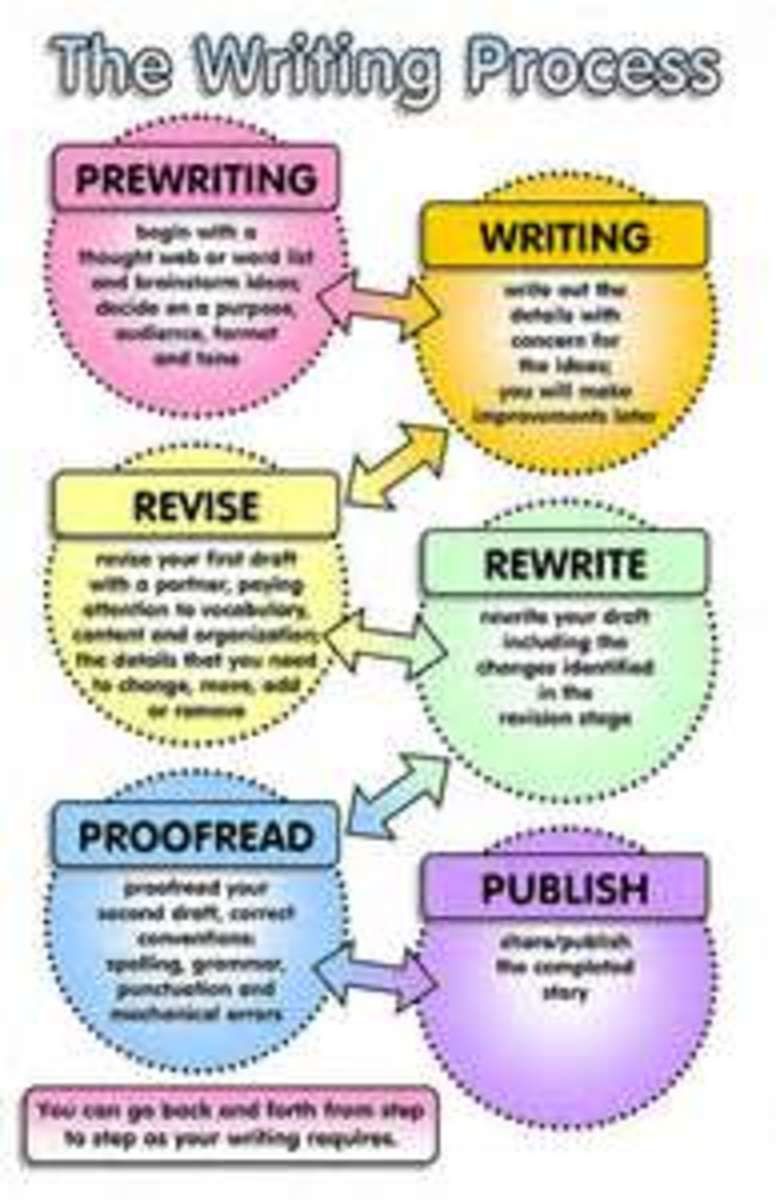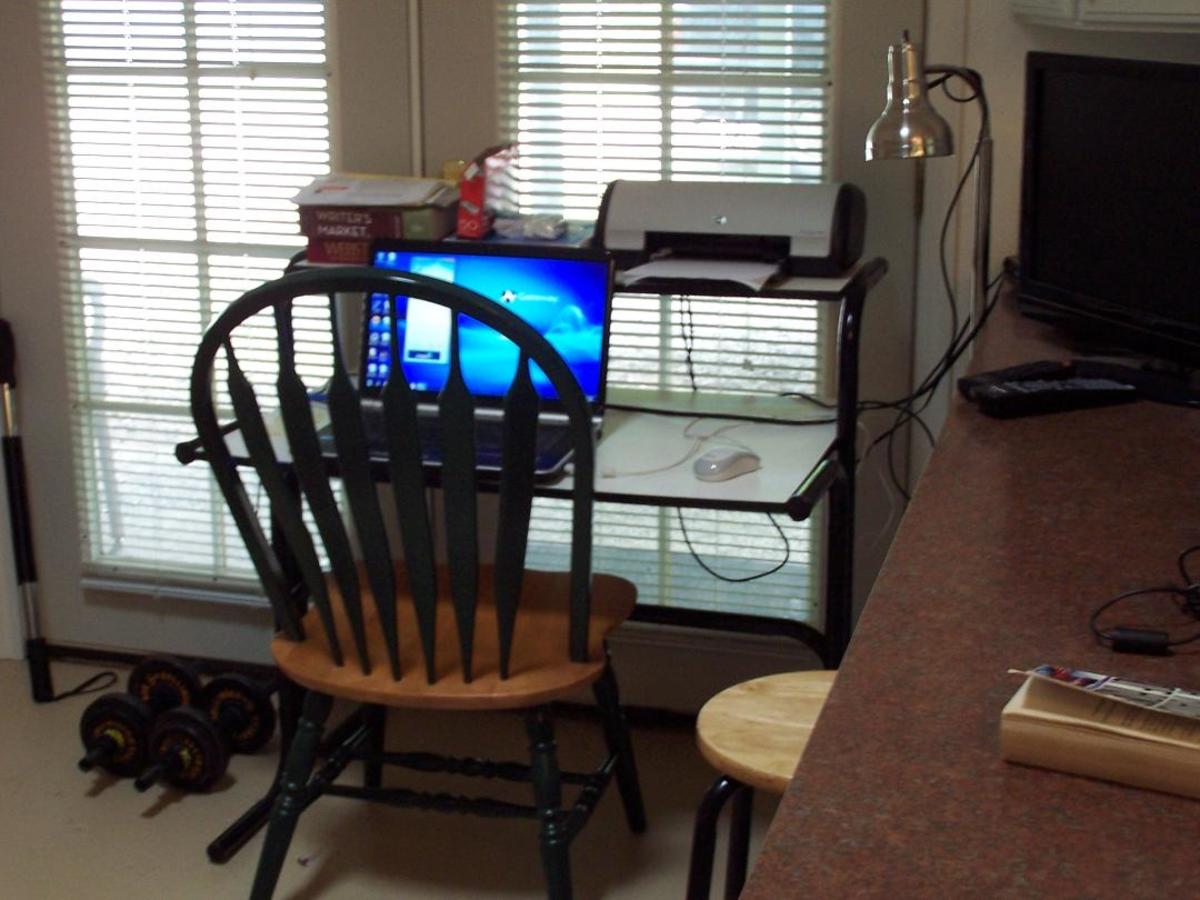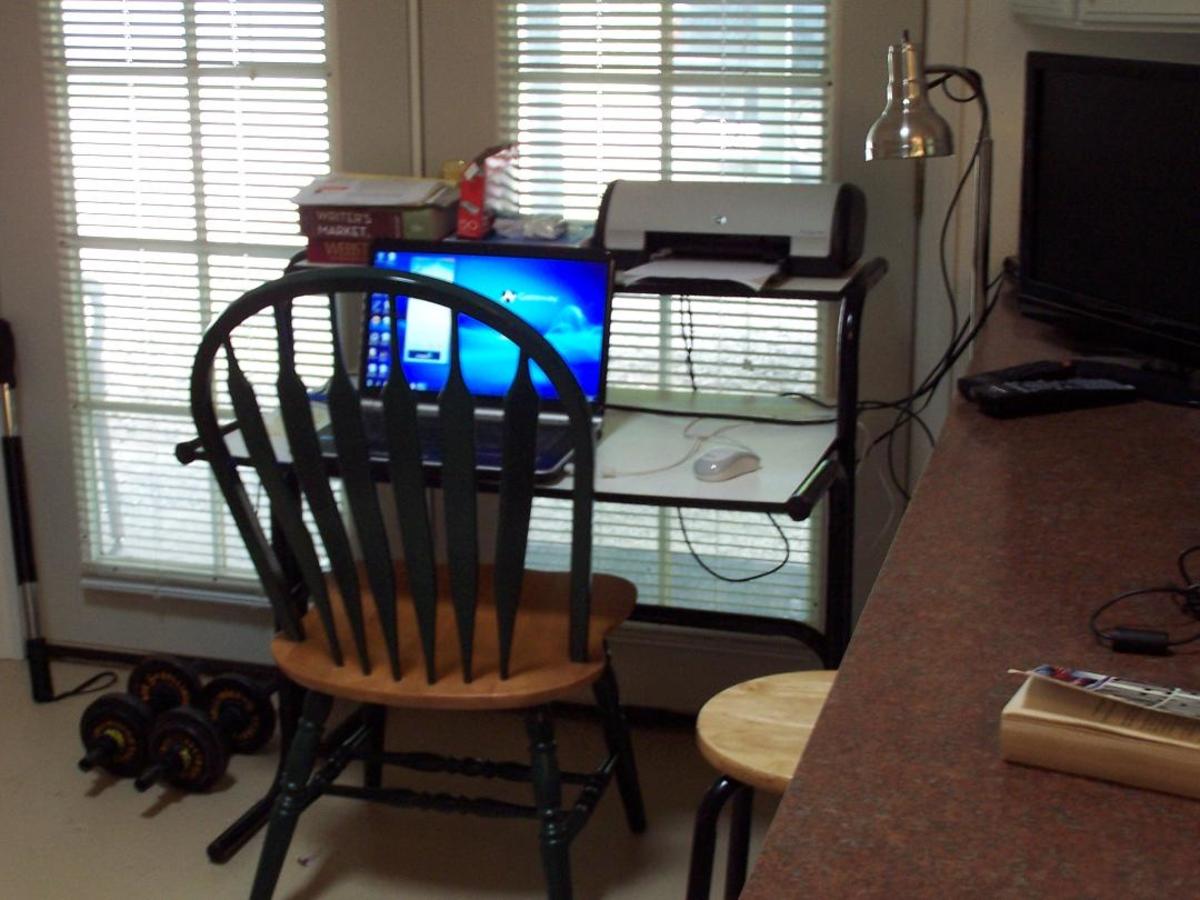Writing Tips for Beginners
Write Write and more Writing
In front of me is the blank white screen. Look at it just staring back at me, mocking me. Yeah, I see you idly waiting for us to write something.
Great...And now I'm talking to myself. "Just write anything, buddy. Anything! I mean this is a guide for writing, isn't it? Hello? Come on, write something about writing lessons or how to improve your writing. Holy cow, write a word. Just one word!"
(Snap back into focus) The screen is still white and that funky little cursor is continuously blinking at me. Blink...Blink...Blink..."You're an annoying little bastard, you know that?"

Writing Process
Does the above sound familiar? Of course it does.
No doubt, writing can be an arduous task, creating a lot of heartbreak and despair. It's a lonely place really, filled with darkness. There's nobody there to hold your hand. There's nobody there to force you to write. But somehow, as if by chance, you do manage to throw some words together. Some of those words make sense and others don't.
Of course, you've heard all of this before. I'm not spitting out anything new. I'm sure some of you have read how to write books teaching you various writing skills and writing styles. So, I'm going with a different approach.
Although this article is about writing, I'm not going to teach you how to write. That's something you need to learn on your own. However, I am going to provide examples of what not to do.

Writing Tips for Beginning Writers
First you need to ask yourself, “Am I willing to learn how to write? Am I ready to put in hours and hours of my precious time in order to improve my writing skills?”
Writing is not as simple as throwing a bunch of words together and patiently waiting for a paycheck. No, writing is far from that.
Writing is an ongoing process. It's nights upon countless nights of brainstorming, editing, revising, reading, and more writing. It’s a continuous puzzle that needs constant care on every chapter, every paragraph, every sentence, and every word.
For instance, that last sentence alone took me about 5 minutes. Five grueling minutes to come up with that crap! You see, you need to take in account for flow, rhythm, and uniqueness. All the while, you must keep your audience entertained and focused. And I hope for your sake, I did just that!
Most importantly, becoming a writer is about learning from one's mistakes. This rule applies to all writers whether they're writing an article, essay, screenplay, fiction nonfiction book, graphic novel, or pamphlet. So, what better way to learn how to write then by capitalizing on my own crappy mistakes?

My Top Ten Writing Mistakes
1.) More often then not, I find myself focusing too hard on sentence structure and grammar. The problem is I want it to be perfect the first time out. Needless to say, this takes hours and hours of writing and rewriting.
Lesson One: Don't take your writing too seriously.
Have fun with it and just write. This isn't the stone age where everything is written with a feather ink pen. You have time to correct it later.
Lesson Two: Try to avoid the...
I like to use the dot dot dot after I write something clever or I want to provide a little pop to the sentence. You know, the classic...wham bam...thank you, ma'am. It's annoying and is usually regarded as amateurish or immature.
Lesson Three: Stop repeating yourself when you write!
Sometimes I fall in love with a word and want to use it over and over again. I'll stumble on a word like, regardless, and instinctively find inventive ways to fit into a sentence. Saying the same thing over and over again is a big no no.If a word keeps resurfacing flush it out with a different word.
Lesson Four: Don't Procrastinate!
I love to procrastinate. If there is a particular scene or chapter that I am dreading to hash out, I will find every excuse possible not to write it. Basically, I know the process will be time consuming, so I put the project off.
Just shutoff your mind and take the plunge. You're going to have to face the story eventually. You might as well dive head first into it. Get it out of the way! Procrastinating will only cause anxiety and tension.
Lesson Five: Read and read often!
In the beginning, I never really read anything. In fact, I hated reading chapters upon chapters to finish a 500 page book. I thought it was boring and pointless. Why read something when I can create my own world?
In order to become a great writer, you need to read. Reading provides an unlimited resource of knowledge for all writers. It gives you insight into important skills like writer's voice, sentence flow, writing style, dialogue, third person perspective, etc.
Lesson Six: When in doubt write in active voice.
Sometimes I find myself writing in passive voice. Passive voice is a style where the subject denotes the individual affected by the action of the verb. It's a backwards way of saying something where the receiver becomes more important than the actor. For example:
"The World Trade Center was destroyed by terrorists."
In this scenario, the World Trade Center is the receiver and it becomes the highlight of the sentence.
The active voice is often the preferred choice among writing teachers. Using the same scenario as above, here's an example of active voice:
"The terrorists destroyed the World Trade Center."
See how it is a direct sentence, declaring the action right away? It's a more clear and direct way of saying something.
(Sorry for the little writing lesson there. I swear, I won't do it again!)
Don't misinterpret what I'm saying here. Passive voice is a great weapon if used correctly. If you're describing past events through a first person's perspective, passive voice can be a very effective tool. However, more often than not, writers use passive voice to 'flower up' a sentence. Don't write scared! Write it like you mean it!
Lesson Seven: No Drugs!
I drink way too much caffeine. Although coffee keeps me alert, sometimes I go a little overboard with it. I get jittery and my ability to focus is shot to pieces.
I know some people who say they write better when they are high and on cloud nine. My suggestion, if you are going to write then have a clear mindset going into it. Although you want a little freedom and creativity, I believe clarity is the key to great writing.
Lesson Eight: Write Everyday!
Sometimes I don't write at all. I'll skip 2-3 days between writing sessions and then try to make it all up in one sitting.
Whatever you do, make time to write something every single day. Don't say that you will make it up tomorrow. Make writing a priority. Remember you made the commitment to become a writer, so you better stick to it.
Lesson Nine: Learn to take criticism
There are times when I don't take criticism lightly. Sometimes I'll get defensive and obnoxious, especially if somebody attacks my writing.
There will be times people will not like your writing. They may be really harsh, and you may not like what they have to say. Take it with a grain of salt. Criticism is great. It gives you instant feedback and will help you mature as a writer.
Lesson Ten: No distractions!
A lot of times I will distract myself in the middle of a scene or thought. The writing may not be gelling or I may have a sudden writer's block moment. So, I'll surf the internet to pull me away from the situation.
Much like step 4, plot out a certain time of the day to write and suck it up. Stick to that window. You can do it, I promise!









